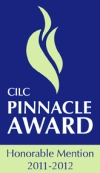Language program administrators often struggle with how to promote their programs. They want to increase student enrollment and retention in the programs and yet, resources of time and money are often scarce. Moreover, many administrators lack training or interest in marketing and so, it gets pushed aside. Or half-hearted attempts are made through endeavours such as producing a brochure using a template from MS Word.
One question that must be asked is, do language programs have an inherent or intrinsic worth of their own or are they merely a means to an end, such as a way to get a job or to improve one’s chances of getting into a university program (extrinsic worth)? Language learning and international education enriches a student’s knowledge and understanding of the world around them (and themselves) in ways that are difficult to evaluate and almost impossible to quantify. This personal and academic enrichment in the form of knowledge of language and culture is worthwhile in and of itself. In addition, the skills these programs provide in terms of foreign language communication and cross-cultural competence may lead to better opportunities in terms of education or employment, which are extrinsic to the program itself.
For Mohandas K. Gandhi learning languages was a way to better understand the world around him and ultimately, to change it for the better. Gandhi’s first language was Gujarati. His began to learn other languages in school, where English and Sanskrit were compulsory (Gandhi, 1948, p. 9).
It was during his time in law school that he became committed to learning other languages as a way to advance his work, noting that limited language skills for him meant that he would not work in his desired profession. He stated:
“My weak English was a perpetual worry to me. . . . A friend suggested that, if I really wanted to have the satisfaction of taking a difficult examination, I should pass the London Matriculation. It meant a good deal of labour and much addition to my stock of general knowledge, without any extra expense worth the name. I welcomed the suggestion. But the syllabus frightened me. Latin and a modern language were compulsory! How was I to manage Latin? But the friend entered a strong plea for it: ‘Latin is very valuable to lawyers. Knowledge of Latin is very useful in understanding law-books. And one paper in Roman Law is entirely in Latin. Besides a knowledge of Latin means greater command over the English language.’ It went home and I decided to learn Latin, no matter how difficult it might be. ” (Gandhi, 28)
In addition to learning, to varying degrees, Sanskrit, English, French and Latin, he also learned Hindi and Urdu, in order to communicate with others in his country, understand their situation better and work towards bettering their lives. In addition, while he was in jail he endeavoured to learn Tamil and Telugu (p. 176) and used his skills in these languages to communicate and work with illiterate soldiers in South Africa to help them fight for human rights (p. 88). Finally, he added Arabic and Persian to the list of languages he endeavoured to learn (p. 176-177) and did so through informal lessons with friends. That is a total of eleven languages, including his native tongue.
He saw learning languages as a way of communicating better with others and understanding the world more profoundly. Not surprisingly, he believed that everyone should learn more than one language, stating that, “It is now my opinion that in all Indian curricula of higher education there should be a place for Hindi, Samskrit, Persian, Arabic and English, besides of course the vernacular.” (Gandhi, 1948, p. 9). Gandhi not only understood the value of learning languages, he passed it on to his students. As with many who work with second and foreign languages, he was both a student and teacher of language.
The work of promoting a language program can be tricky. It is easier to focus on the skills that students will acquire that may increase their chances of meaningful employment when they graduate. Guidance counsellors and teachers can cite careers in the foreign service or international business as good reasons for taking courses in a foreign language. That’s because it is easier to talk about concrete outcomes and examples, than it is to talk about intangible concepts such as personal enrichment and knowledge.
While not everyone who learns another language may go on to have a profound effect on the world to the degree that Gandhi did, any person who learns a new language grows as a human being because they can communicate with others in new ways. This helps to develop a more profound curiosity about the world around us, which leads us to learn more about that world. Learning more about the world and those who live in it leads to deeper understandings of other cultures, other values and other ways of understanding life, love, politics, spirituality and all that is important to humans. Learning other languages opens up new possibilities for personal and professional growth, new opportunities to do meaningful work and ultimately, to value others more deeply because we can communicate with them better and understand them.
The best way to promote languages is to value them deeply, rather than simply focus on the skills that may be gained as a result of taking classes in them. When we learn a new language we change who we are, and we become better for it. That is the real reason we want our students to learn other languages. Focussing on that is in itself one of the best ways to promote our programs.
Reference
Gandhi, M. K. (1948). An autobiography or the story of my experiments with truth (M. Desai, Trans.). Bombay: Navajivan Publishing Centre.
(Originally published in the June 2009 issue of Zephyr, Newsletter of the Second Languages and Intercultural Council, Alberta Teachers Association. It is reprinted here with permission of the editor.)
___________
Related post: Leadership through Language Learning and Teaching: The Case of Gandhi
Like this post? Share or Tweet it: What Gandhi knew about marketing language programs http://wp.me/pNAh3-22
Update – January 2018 – This blog has had over 1.8 million views thanks to readers like you. If you enjoyed this post, please “like” it or share it on social media. Thanks!
Sarah Elaine Eaton is a faculty member in the Werklund School of Education, University of Calgary, Canada.



Awesome work. I always find very unique posts here on your Blog.